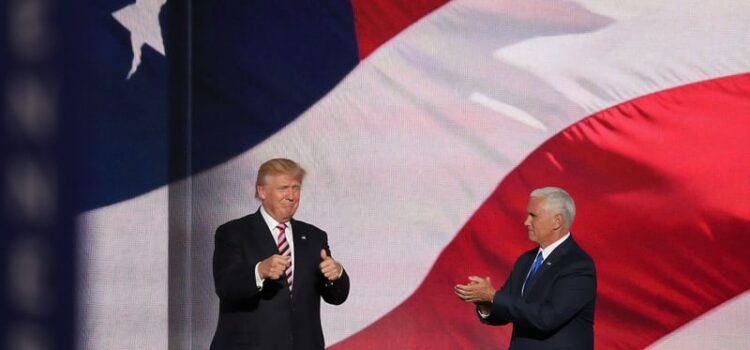

This article is an excerpt from the Shortform book guide to "A Warning" by Anonymous. Shortform has the world's best summaries and analyses of books you should be reading.
Like this article? Sign up for a free trial here .
Was Donald Trump a good leader? What do you think are the most important personal qualities a leader must have?
In A Warning, a book about Trump’s presidency written anonymously, the author discusses the behind-the-scenes of Trump’s presidency. He notes that Donald Trump is not fit to run a nation because his views aren’t consistent as they aren’t connected to any core beliefs or principles.
Here is what Anonymous has to say about Donald Trump as a leader.
Was Donald Trump a Good Leader?
The president’s views are paramount—they set the direction of the administration and determine congressional priorities. They build public confidence and trust.
In discussing Donald Trump as a leader, Anonymous argues that Trump’s views are constantly changing, depending on his whims, the last person he spoke with, or something he saw on television.
He reverses himself constantly, whether on health care, abortion, trade with China, or gun control. From the early days of his administration, he amazed staff with his inability to stick with a position. It provides fodder for comedians, memes, and even the sale of novelties, such as Trump flip-flop sandals with differing messages on the right and left soles.
This is the opposite of what the Republican Party is supposed to stand for. The GOP, which has long considered itself to be the party of principles, should be disturbed at Trump’s style of tossing out random ideas to see what “sticks.” Trump has indeed advanced a number of Republican causes, including making conservative judicial appointments and regulatory changes. However, most of the credit should go to Congressional Republicans or the senior White House staff, who convinced him to stay the course. He made a shambles of other Republican principles.
Republican Delusions
Early in the 2016 campaign, Republican members of Congress, like most people, viewed Trump as an irritant and didn’t take him seriously. But as his momentum grew, so did their alarm.
In response, House Speaker Paul Ryan developed what he called “the Trump inoculation plan.” It was a set of conservative policy proposals, to which he tried to commit Republican members and the party as a whole. The idea was that as the Republican nominee, Trump would be “boxed in” or forced to go along with the program. It might have worked for any candidate but Trump.
He wasn’t driven by conservative principles. He’d changed his party registration five times over thirty years, praised Hillary Clinton, and donated to Democrats. He declared himself a conservative when it suited his interests, treating conservatism as another Trump product to be gussied up and branded with the Trump name.
Some Republicans recognized him as an imposter, including the late columnist Charles Krauthammer and at first, radio host Rush Limbaugh. Instead of campaigning on substance, Trump spent his time demeaning other candidates; he treated the primary debates like playground battles. When he did express views, they were anti-conservative—for instance, he expressed interventionist ideas for the economy. He kept winning and Ryan’s inoculation plan failed.
With Trump as president, the Republican Party is now a mass of contradictions. Trump’s greatest deviations from conservative principles have concerned the size of government, defense, immigration, and the economy.
An Advocate for Big Government
Trump is a champion of big government, although he decries Democrats for having socialist views. In some ways, the government under Trump is even larger and more wasteful than it was in the previous Democratic administration.
Due to the 2011 Budget Control Act passed by Congressional Republicans, the deficit was shrinking under Obama. However, in a deal with Democrats, Trump discarded the act’s spending limits. The deficit has risen each year of the Trump administration—the government will soon be spending a trillion dollars more than it brings in. In addition, the U.S. debt (money we borrow from other countries) has reached another record. Trump proposed a record-high budget in 2019.
This profligacy betrays conservative principles and breaks Trump’s promises of fiscal responsibility—he pledged to eliminate the debt during his time in office, apparently just to lull conservatives into supporting him.
He appears to be as unconcerned about bankrupting the country as he has been about driving his businesses into bankruptcy. According to sources, when a handful of conservatives cautioned him on the dangers of runaway spending, he answered, “Yeah, but I won’t be here.” Trump’s love for grandiose things apparently includes a big federal government, when it can be used to enhance his power.
A Disaster for Defense
Trump pledged to strengthen Defense and Homeland Security, and his policies have led to superficial improvements—for instance, greater military spending (which has increased debt). He’s sought to raise pay for troops and modernize U.S. forces. But his conduct toward the military has been disastrous.
Rather than respecting military leaders as nonpartisan defenders of the U.S., he refers to them as “my generals” and treats them as chess pieces he can move at whim. Although he ducked military service himself, he likes to project toughness and pull the military into the political debate—for instance, proposing to bring back torture, until aides convinced him terrorists would use it as propaganda.
Many in the military are dismayed at Trump’s poor leadership and foreign policy decisions, which have undermined U.S. security. For instance, he’s seesawed on Iran, first proposing an unprecedented face-to-face meeting with Iranian leaders, then swinging the opposite direction. He wanted to respond with a military strike when Iran shot down a U.S. drone in 2019. But he suddenly called it off when warplanes were only minutes from their targets. Within a few weeks, he was talking again about a face-to-face meeting. It’s one thing for Trump to keep changing his mind about something like military uniforms, but when he does it with airstrikes, he’s courting disaster. (The full story of the risk he has posed with his impulsiveness won’t be revealed for years.)
Obsessed With ‘The Wall’
Trump has turned the vital issue of homeland security on its head. To him, the most important aspect is “The Wall.” He brings it up in meetings more often than any of the other issues he raises randomly.
An inside joke among White House staff is that being tasked with designing Trump’s border wall is the worst job in the administration because his ideas about it are ever-changing. So far he’s promised reinforced concrete, a solar wall that generates electricity, a wall you can see through, a steel wall with openings, an artistically designed wall, and a wall of steel and concrete. He has asserted that construction is underway, that Democrats or the courts are blocking it, or that he will build the whole thing without involving Congress. At times, staff find it laughable. In fact, his construction efforts have been limited to the replacement of older fencing.
In any case, experts say hundreds of miles of new wall wouldn’t solve the immigration problem.
Migrants will still be able to come to border entry points and file for protected status; they will then be admitted for years, while their cases wind through the courts. That’s the problem he should be addressing.
Anti-Immigration Fervor
Meanwhile, Trump has reversed America’s reputation as a nation of immigrants, though the conception of the U.S. as a haven for people seeking a fresh start has long been part of Republican dogma.
Without a doubt, Trump is anti-immigrant; immigration is on his mind at virtually every meeting, whether it’s the subject of the meeting or not. During one anti-immigration diatribe, Trump imitated a Hispanic accent, while saying: “We get these women coming in with like seven children. They’re saying, ‘Oh, please help, my husband left me.’ They’re useless.”
Although he’s drastically cut the number of refugees being admitted to the U.S., Trump has proposed a total admissions ban on those fleeing persecution. He’s announced a variety of new restrictions on immigration, including a wealth test.
Republicans need to affirm that having an “open door” for immigrants doesn’t mean having an open border. We can have sensible immigration policies without shutting the door on immigrants, who historically have strengthened our country.
Goodbye to Free Trade
Perhaps Trump’s biggest betrayal of conservative principles has been his rejection of free trade—he’s a stubborn protectionist. Trump has imposed new trade barriers based on a wrongheaded view of economics. He doesn’t understand trade but doesn’t listen when experts try to explain it to him.
Trump believes placing tariffs or fees on imports will make our country wealthier, when actually, it will make the things we buy more expensive.
Here’s an example of how Trump thinks tariffs work: If we put a 20% tariff on sweaters from India, we’ll get $6 on every imported sweater. In effect, Indians will be paying us to buy them. With sweaters selling for higher prices, U.S. manufacturers will start making them again and have an edge over India because U.S. companies won’t be paying the $6 per sweater fee. It will create jobs as well.
However, what will really happen is that Indian manufacturers will raise the price of sweaters they sell in the U.S. by $6. U.S. companies will lose money because a greater share of consumer dollars are going to the more expensive imported goods instead of other things they could be buying.
Trump’s tariffs are a back-door tax on Americans that will cost them more than they saved under his 2017 tax cut. Further, some experts estimate his actions have already caused the loss of hundreds of thousands of jobs. The effects will continue to spread to every industry. Ultimately, low-income Americans who depend on low prices will suffer the most because they’ll have to work longer hours and extra jobs.
It’s time for Republicans to acknowledge that Trump’s economic policies violate conservative principles and are bad for the country.

———End of Preview———
Like what you just read? Read the rest of the world's best book summary and analysis of Anonymous's "A Warning" at Shortform .
Here's what you'll find in our full A Warning summary :
- An inside look at the chaotic Trump administration written by a senior Trump administration official
- An examination of Trump's authoritarianism and threats to democracy
- The three options that existed for removing Trump from office






